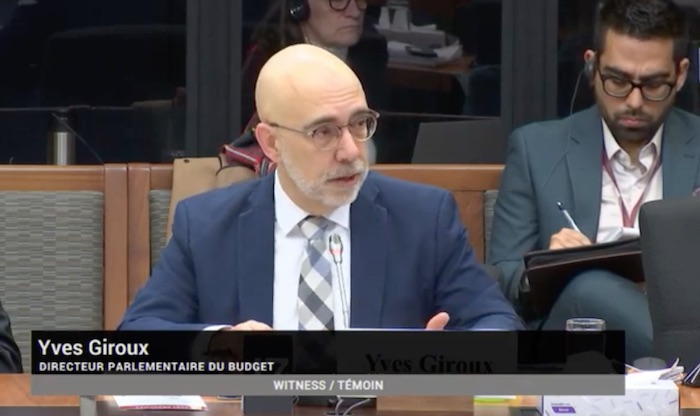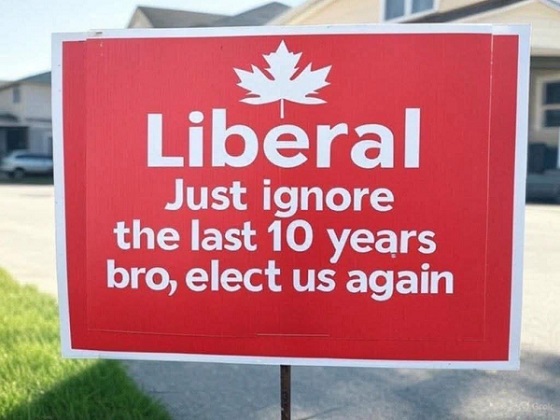National
“Broken” Federal public service system requires overhaul says Canada’s PBO

Canada’s Parliamentary Budget Officer says the federal public service is letting Canadians down.
Facing questions from the Senate National Finance Committee on Tuesday, Yves Giroux says the public service system is “broken”.
Senator Larry Smith asked about Giroux’s experience with budget estimate reports from federal ministries coming in late, incomplete or sometimes not at all. Giroux replied with some stunning statements, claiming federal cabinet ministers “are not very well equipped to challenge their own officials.”.
According to Giroux’s testimony “We end up in a situation where it’s public servants responsible for delivering programs that set their own targets, and they usually set the bar not too high so that it doesn’t look too easy, but neither too low, so it’s fairly easy to achieve most of the time”.
“But yet by their own assessment, they fail to deliver upon many of these.”
The PBO then called for a leadership overhaul of federal departments, emphasizing there is “clear room for enhanced leadership to improve service delivery.”
2025 Federal Election
Poilievre promises to drop ‘radical political ideologies’ in universities

From LifeSiteNews
Conservative Party leader Pierre Poilievre has pledged to prioritize funding scientific research over ‘radical political ideologies’ at Canadian universities.
Conservative Party leader Pierre Poilievre has promised to scrap government funding of “radical political ideologies” in higher education if elected prime minister.
During an April 2 speech in Toronto, Poilievre told a French reporter that his Conservative government will focus on promoting scientific research rather than furthering radical ideologies in Canadian universities.
“The money we spend on research will go to research, not to promoting political ideologies,” Poilievre said. “We want, for example, our science and technology research to go into technological breakthroughs, inventions, innovations, discoveries, cures for terrible diseases that can improve Canadian lives.”
“That is what Canadians expect their tax dollars to go to, not to spend it on radical political ideologies that are first of all completely out of touch with the values of Canadians, and second of all, have no scientific value to our people,” Poilievre added.
This was the second time Poilievre denounced woke spending at universities, the first time being at a Quebec rally last week.
The policy proposal has seemed to draw the ire of some in academia, with Canadian Association of University Teachers (CAUT) executive director David Robinson stating, “It’s worrying that a leader of a political party in Canada would try to dictate how research funds will be granted.”
“We’ve seen the impact of this political meddling south of the border where the Trump administration has launched a full-scale assault on universities and the scientific community,” he continued. “This kind of American-style culture war has no place in Canada.”
Under U.S. President Donald Trump, public schools and universities were given until the end of February to eliminate their DEI (diversity, equity and inclusion) programs or risk losing federal funding.
More than 30 states have introduced legislation that would eliminate DEI programs from education as part of a broader push against woke ideology spearheaded by Republicans such as Virginia Gov. Glenn Youngkin and Florida Gov. Ron DeSantis.
Conservatives have long criticized DEI and other forms of identity politics for stoking rather than curtailing division. Moreover, many take issue with left-wing ideologies, such as gender ideology, because they contain objective falsehoods such as the denial of biological reality in determining sex.
2025 Federal Election
Will Four More Years Of Liberals Prove The West’s Tipping Point?

The 1997 political comedy Wag The Dog featured a ruling president far behind in the polls engaging Hollywood to rescue his failing ratings. By inventing a fake war against Albania and a left-behind “hero”— nicknamed Shoe— the Hollywood producer creates a narrative that sweeps the nation.
The meme of hanging old shoes from the branches of trees and power lines catches on and re-elects the president. In a plot kicker, the vain producer is killed by the president’s handlers when he refuses to stay quiet about his handiwork. The movie’s cynicism over political spin made it a big hit in the Bill Clinton/ Monica Lewinsky days.

In the recent 2024 election the Democrats thought they’d resurrect the WTD formula to spin off senile Joe Biden at the last minute in favour of Kamala Harris. Americans saw through the obvious charade and installed Donald Trump instead.
You’d think that would be enough to dissuade Canadians who pride themselves on their hip, postmodern humour. But you’d be wrong, they don’t get the joke. Wag The Carney is the current political theatre as Liberals bury the reviled Justin Trudeau and pivot to Mark Carney. If you believe the polling it might just be working on a public besotted by ex-pat Mike Myers and “Canada’s Not For Sale”.
As opposed to Wag The Dog, few are laughing about this performative theatre, however. There are still two debates (English/ French) and over three more weeks of campaign where anything— hello Paul Chiang—can happen. But with Laurentian media bribed by the Libs— Carney is threatening those who stray— people are already projecting what another four years of Liberals in office will mean.
As the most prominent outlier to Team Canada’s “we will fight them on the beaches…” Alberta’s premier Danielle Smith is already steering a course for her province that doesn’t include going to war with America on energy. She asked Trump to delay his tariffs until Canadians had a chance to speak on the subject in an election April 28. Naturally the howler monkeys of the Left accused her of treason. She got her wish Wednesday when Canada was spared any new tariffs for the time being.

Clearly, she (and Saskatchewan premier Scott Moe) have no illusions about Carney not using their energy industry as a whipping post for his EU climate schemes. They’ve seen the cynical flip in polls as former Trudeau loyalists hurry back to the same Liberal party they abandoned in 2024. They know Carney can manipulate the Boomer demographic just as he did when he called for draconian financial methods against the peaceful Truckers Convoy in 2022.
Former Reform leader Preston Manning is unequivocal: “’Large numbers of Westerners simply will not stand for another four years of Liberal government, no matter who leads it.’“ So how does the West respond within Confederation to protect itself from a predatory Ottawa elite?
Clearly, the emissions cap— part of Carney’s radical environmental plans— will keep Alberta’s treasure in the ground. With Carney repeating no cancellation of Bill C-69 that precludes building pipelines in the future, the momentum for a referendum in Alberta will only grow. The NDP will howl, but there will be enough push among from the rest of Albertans for a new approach within Canada.
In this vein Smith even wants to approach Quebec. While it seems like odd bedfellows the two provinces most at odds with the status quo have much in common . “This is an area where our two provinces may be able to coordinate an approach,” Smith wrote this week. That could include referendums by the middle of 2026.
Perhaps the best recipe for keeping the increasingly fractious union together is a devolution of power, not unlike that governing the United Kingdom. While Westminster remains the central power since 1997, there are now separate parliaments in Scotland, Wales and Northern Ireland that put power closer to the citizen, so that local factors are better recognized in decision making.
With so little uniting the regions of the country any longer, devolution might provide a solution. What form could decentralization take within Canada? A Western Canada Parliament could blunt predatory federal energy policies while countering the imbalances of Canada’s equalization process. Similar parliaments representing Quebec, the Atlantic provinces, Ontario and B.C. would protect their own special interests within Canada. Ottawa could handle Canada’s international obligations to defence, trade and international cooperation.
While the idea is fraught with pitfalls it nonetheless remains preferable to a breakup of the nation, which four more years of Liberals rule under Mark Carney and the same Trudeau characters will likely precipitate. Smith’s outreach case would be the beginning of such a process.
None of this would be necessary were the populations of Eastern Canada and B.C.’s lower mainland remotely serious after snoozing through the Trudeau decade. The OECD shows Canada’s 1.4% GDP barely ahead of Luxembourg and behind the rest of the industrialized world from 2015-2025. As we’ve said before the Boomers sitting on their $1 million-plus homes are re-staging Woodstock on the Canada Pension and OAS. As with Wag The Dog, they’re not getting the joke.

When the Boomers award themselves another four years of taxapalooza and Mike Myers and the other “Canada Not For For Sale” celebs head south to their tax-avoidance schemes how will the Boomers say they’ve left Canada better off for anyone under 60? We’ll hang up and listen to your answer on the TV.
Bruce Dowbiggin @dowbboy is the editor of Not The Public Broadcaster A two-time winner of the Gemini Award as Canada’s top television sports broadcaster, his new book Deal With It: The Trades That Stunned The NHL And Changed hockey is now available on Amazon. Inexact Science: The Six Most Compelling Draft Years In NHL History, his previous book with his son Evan, was voted the seventh-best professional hockey book of all time by bookauthority.org . His 2004 book Money Players was voted sixth best on the same list, and is available via brucedowbigginbooks.ca.
-

 2025 Federal Election2 days ago
2025 Federal Election2 days agoMORE OF THE SAME: Mark Carney Admits He Will Not Repeal the Liberal’s Bill C-69 – The ‘No Pipelines’ Bill
-

 2025 Federal Election2 days ago
2025 Federal Election2 days ago‘Coordinated and Alarming’: Allegations of Chinese Voter Suppression in 2021 Race That Flipped Toronto Riding to Liberals and Paul Chiang
-

 2025 Federal Election1 day ago
2025 Federal Election1 day ago‘I’m Cautiously Optimistic’: Doug Ford Strongly Recommends Canada ‘Not To Retaliate’ Against Trump’s Tariffs
-

 Business1 day ago
Business1 day agoCalifornia planning to double film tax credits amid industry decline
-

 Alberta2 days ago
Alberta2 days agoEnergy sector will fuel Alberta economy and Canada’s exports for many years to come
-

 Business1 day ago
Business1 day agoCanada may escape the worst as Trump declares America’s economic independence with Liberation Day tariffs
-

 Alberta1 day ago
Alberta1 day agoBig win for Alberta and Canada: Statement from Premier Smith
-

 2025 Federal Election2 days ago
2025 Federal Election2 days agoDon’t let the Liberals fool you on electric cars





